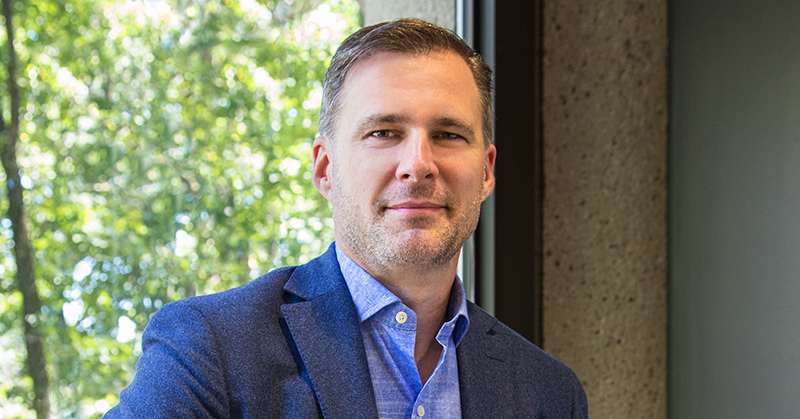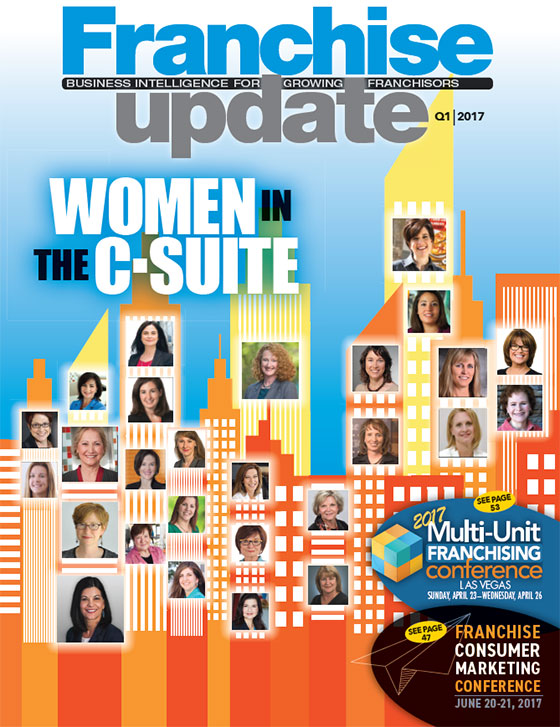Top Shelf: Empower, Innovate, Delegate, and Disrupt

Allan Young will tell you straight up that his job begins and ends with accountability. It's just the way the 46-year-old CEO of Noble Brands sees it. "My job is to remain accountable for the entire organization, while delegating almost every responsibility," he says. Even though that may seem, as he puts it, an "uncomfortable dynamic to understand and live with," he embraces it with gusto and says it has been life changing to his role as a CEO.
Young also understands that it's imperative for him to set the vision of the organization. "I am passionate about my vision for the future of our companies and rely strongly on my leadership team to accomplish that vision," he says. And he sees himself as a better leader when he's encouraging the team to push decision-making as far out into the organization as possible.
Noble Brands is an Atlanta-based franchisor of two concepts. ShelfGenie began franchising in 2008 and has 160 locations throughout 29 states and Canada. Outback GutterVac, was launched in 2012 and just began franchising in late 2016.
Young doesn't shy away from progressive strategies such as empowerment, innovation, and disruption. In fact, he embraces it. "In 2015 we acquired a manufacturing and distribution company to get vertically integrated and control our quality, production, and delivery model," says Young. "In 2016 we turned our different service departments into separate companies that operate as autonomous start-ups in a Noble Brands incubator model." Young says these moves and more have set the foundation for rapid growth with their current brands and set the stage for new products and companies in the future.
Name: Allan Young
Title: CEO
Company: Noble Brands
Units: 160 ShelfGenie, 8 Outback GutterVac
Age: 46
Years in franchising: 10
Years in current position: 10
Leadership
What is your role as CEO?
My role starts and ends with accountability. My job is to remain accountable for the entire organization, while delegating almost every responsibility. If you truly embrace that as a CEO, you have a big issue to solve. Accountability comes after the execution of a plan or task is done, not done, or not done well. Responsibility should happen both before and after the execution of a plan or task. If you fully embrace that you need to delegate responsibility and are ultimately accountable for everything, your first reaction is probably going to be, "That's not fair." Early on, I spent many years saying I understood that dynamic, but I didn't take the difficult steps necessary to fully embrace that reality and work successfully in it.
Learning how to delegate responsibility while remaining accountable for the actions of my team was life changing in my role as a CEO. I had to learn that my job is to lay out a clear vision for the organization, which is the "what" and "why" of where we are going. Those are the responsibilities I can't delegate. I had to get comfortable with fully delegating the "how" to the rest of my team. Most of us are wired to not give up the "how" because when we do, our natural assumption is that we lose control. I've found that as you begin to delegate more responsibility, mistakes and failure happen more often. The keys are to ensure your team embraces and learns from failure and not give into the immediate reaction to regain a sense of control by taking back responsibility.
Describe your leadership style.
I focus on the fundamentals. The first is to set out a vision that everyone sees clearly. That is almost a full-time job since it's not a single event. The second is to spend time with my senior leadership team to help them evaluate more clearly that all of the roles in organization are filled with the right people in the right positions and to ensure everyone is embracing our values and living our culture.
What has inspired your leadership style?
I'm always inspired by great leaders who set out a vision that no one could see at the time, and then successfully led their team to fully see and finally accomplish that vision. Studying those environments, and what happened along the way, is very inspiring when you understand how much ambiguity and chaos existed between the vision being shared and its successful execution. Many leaders assume that high-performance companies made it relatively easily to that point, which no one saw until the trail was blazed. I don't think that's ever been the case.
What is your biggest leadership challenge?
Building a strong culture, by far. Vision has always come naturally to me. And while it's been a challenge to ensure I'm effectively communicating that vision with clarity, it pales in the challenge of building a strong culture that can execute on it--especially when the culture you build flies in the face of everything people are taught in school and much of corporate America. When our teams are all aligned around our culture, the strategic and tactical steps necessary to execute on the end-state vision comes very easily.
How do you transmit your culture from your office to front-line employees?
The first step in building our foundational culture was to establish core values that we are willing to both hire and fire on. I learned a hard lesson early on: you can't establish your values by committee, especially when you don't have a well-defined culture in the first place. After learning that, I spent hundreds of hours determining the values that would lead to a culture that could easily execute on my vision. I landed on three core tenets: Honesty, Integrity, Respect. If you don't live by them, you get ejected from the team immediately. Next, I defined our core values: Entrepreneurial Thinking, Courage, Candor, Reliability, One Team. The detailed behaviors that exhibit those values are crucial to successfully executing on our highly aspirational vision. Our leaders measure everyone in the organization each quarter on those values. If any team member isn't living all of those values, they are given at least three specific examples and are coached in those areas by our leadership team for 30 days. If they still aren't there after 30 days, they are given another 30 days of coaching to improve. If they can't get there during that time frame they are released from the team.
Culture building is my biggest leadership challenge because most teams and leaders don't value culture as much as they do strategies and tactics while you are building a culture. They don't appreciate what they don't have and don't instinctively appreciate that building a strong culture has to come first. Strategies and tactical execution fall into place easily if you get your culture right and the entire team embraces it, lives it and protects it. When we don't do that well, it's always a tactically chaotic environment full of confusion, blame, and excuse.
Where is the best place to prepare for leadership: an MBA school or OTJ?
OTJ for sure. While an MBA is helpful for a foundation of understanding all the moving pieces of a company, nothing prepares you for success better than failure. I'm a huge fan of failure. It's really the only place I've ever learned anything of real value. However, the skills that need to be developed to excel at failure aren't taught in any schools. Those skills have to be learned on the job, and you learn them in our companies by living our culture. I believe that anyone has the potential to learn how to be a great leader if they are willing and able to plan, reduce risk down to an acceptable level, embrace failure when it happens, and celebrate those failures by sharing what they learned with their team.
Are tough decisions best taken by one person? How do you make tough decisions?
Decisions always need to be made by one person. We identify the decision-maker up front and encourage decisions to be made as far out in the organization as possible. However, when you do that, be ready for your team to push back. While people generally like to complain when not being able to make decisions or complain about the decisions made "higher up," you can watch most of them push back on making a decision that was traditionally made by one of their leaders. We encourage vigorous debate with the decision-maker's entire team. This is a place where all of our values become extremely important. The person making the decision needs to have the courage be vulnerable and ask for help. We have to rely on all team members to have the courage to be candid when expressing their views and use entrepreneurial thinking to discover all the available possibilities. Finally, when the decision-maker decides on a course, one team is used to ensure that everyone, regardless of how they feel about the decision, gets behind the decision and supports the person who made it.
Do you want to be liked or respected?
I draw a clear line between like and respect at work. Every day I'm asking my team to embrace risk and take responsibility for their decisions without fear of retribution if they fail. To build that kind of trust with your team, there must be mutual respect. In my personal life, I want my family friends to both like and respect me. However, being "liked" in the work environment is too subjective to be productive and doesn't allow for making tough decisions when parts of the organization aren't aligning with my vision.
Advice to CEO wannabes:
Being a CEO means you always have to look at the overall organization, which includes your entire team (employees), partners (franchisees and their teams), and clients or customers. Understand that all of the decisions and actions you and your team make have a profound effect on that entire ecosystem. This will allow you be a better CEO. Remember that if you set a precedent, you'll have to stick with it for a long time, especially in franchising. This will also help ensure you think through and explain the "why" you or your team used when you make decisions, and help them understand the reasoning behind those decisions won't be a moving target. Finally, all leaders, and especially CEOs, should be extremely curious and constantly looking for ways to learn, understand, and develop. Doing so will allow you to be both confident and humble, and that's one of the best leadership examples you can ever set.
Management
Describe your management style:
Since my main role is to lead by communicating our vision and set the best example on how to live our core values and culture, I rarely manage. But I do when I see the team isn't pointed in the direction of the vision. It's usually a quick adjustment and I get out of the way after that. Since we're a relatively flat and non-hierarchical company, I am also there if anyone on my team hits a roadblock or isn't getting anywhere with their normal reporting structure. Those moments are almost always a culture issue and I can provide perspective to everyone involved to get to the real issue, which is rarely what is normally reported. I also like to walk around and ask questions. This allows me to understand what's really going on so I can provide that clarity to my leadership team, who can sometimes miss some of these observations. I've found these misses happen when the leadership team is knee-deep in execution and managing issues they don't feel comfortable pushing out. As a result, they are not always as close as they should be to the action/transaction. When that happens my job is to back them up with information and clarity.
What does your management team look like?
Our leadership team are highly autonomous, entrepreneurial thinkers who love to go against the traditional norms of a corporate environment. I have an outstanding COO, Gillian Harper, and everyone ultimately reports to her. She leads the team on finding and executing on the "how" of the vision. Throughout our leadership team, asking for help is not viewed as a sign of weakness, it's encouraged. It's how we build trust and get to the best thinking very quickly. I encourage my leadership team to share their failures with everyone so together they can address how to move forward.
How does your management team help you lead?
They've recently become very good at questioning success. They use that as a highly effective way to encourage people to embrace failure. They've found that many of our successes don't often have as many of the positive elements that exist in embracing failure, learning from it, and adjusting. They also mentor me and provide me with feedback on my own leadership blind spots.
Favorite management gurus: Do you read management books?
I usually read 3 to 4 leadership books a month. The one that stands out is Traction by Gino Wickman. His book outlines his Entrepreneurial Operating System (EOS) that takes many of the great thought leadership pillars from people like Patrick Lencioni, Jim Collins, and Stephen Covey and puts them into a process that's extremely helpful when running a fast-growing company of our size. I've found that Mindset: The New Psychology of Success by Carol Dweck is useful every day. The principles of having a growth mindset align with our values and culture perfectly. Whenever encountering a culture issue, it's usually a result of a fixed mindset.
What makes you say, "Yes, now that's why I do what I do!"?
Seeing our employees embrace disruption and get behind a shared vision and culture. It's thrilling to watch them grow as we begin to launch several new brands outside of ShelfGenie and Outback GutterVac.
Operations
What trends are you seeing with consumer spending habits in your stores?
Everyone is now seeking out the best value, but not necessarily the best price. The latter is what's often assumed. Since we provide a higher value proposition than anyone in our industries, and each company is driven by its own "Noble Purpose," it keeps us out of the competitive commodity arena, where no one wins. We choose clients who are attracted to our Noble Purpose (our "why") and who appreciate our approach to delivering value that always exceeds what we charge. Those are the reasons many of our same store KPI metrics increased more than 20 percent in Q3 for our current brands.
How is the economy driving consumer behavior in your system?
Our brand has remained economy-neutral, so we don't necessarily attribute any slowdown to economic factors. We never use the economy as a crutch because we want our franchisees to focus on delivering value that exceeds the expectations of our clients. Our measure of success in this area is best reflected in our Net Promoter Score (NPS), which averages above 80 when combining our current brands.
What are you expecting from your market in the next 12 months?
ShelfGenie made the market for custom glide-out shelving. We have built the standard for our fragmented industry and view ourselves as our best competitor. After several years of successfully piloting Outback GutterVac in Atlanta and licensing to further test in several other markets, we've just begun franchising. In 2017 we plan to onboard more than 50 franchisees with more 150 territories.
Are your franchisees bullish or bearish about growth and adding units?
Our franchises are growing same store sales with strong double digits and are confident in both their value proposition and in the home office team to continue to support their growth both rapidly and responsibly.
Are commodity/supplies costs any cause for concern in your system?
We own much of our supply chain and have significant buying power in the areas we don't own, which allows us to significantly mitigate that risk. We also have the capital necessary to purchase significant inventory when prices are low.
Personal
What time do you like to be at your desk?
Our office is very fluid and non-traditional and I'm never at my desk for very long. I encourage our team to telecommute when they need some extra time to focus and take a break from the high levels of interaction that exist in our office. I've found this approach leads to increased productivity, and with the implementation of Slack messaging and other communication technology it is easy to stay up to speed, regardless of where we are working.
Exercise in the morning? Wine with lunch?
I believe waking up early is one of the consistent habits of highly successful leaders and exercising is a great way to kick off the day. I have my same-page meeting with my COO every Monday at 8 a.m. I don't do wine with lunch during the work day as that would certainly cause a severe reaction with the 8 cups of coffee I drink each morning, but we do have a "Thirsty Thursday" event at 4 p.m. from time to time, which includes a choice of beer or wine.
Do you socialize with your team after work/outside the office?
I believe passion and teamwork should be celebrated, so we make a point to schedule offsite events with the team and, of course, a Thirsty Thursday on occasion.
Last two books read:
Primed to Perform by Neel Doshi, and Grit: The Power of Passion and Perseverance by Angela Duckworth.
What technology do you take on the road?
I prefer technology that can easily fit into my travel backpack. That normally includes my MacBook Air, iPad mini, Kindle Paperwhite, iPhone, and all the necessary adapters and chargers.
How do you relax/balance life and work?
We have a remote cabin in North Georgia where I go with my wife Teresa and son Paige on weekends. No TV, lots of outdoor activities, meals, and board games. Each year, we usually take a long trip out of the country, or at least out of cell coverage, where I completely disconnect from work.
Favorite vacation destinations:
Our family rarely takes the same vacation twice, so our favorite destination can change frequently as we explore new places. However, a family favorite has always been renting a sailboat in the British Virgin Islands for about 10 days and sailing it ourselves. On those vacations, we set our itinerary each morning based on the best-looking island in sight and we're completely unplugged from the rest of the world.
Favorite occasions to send employees notes:
I want to get rid of those traditional lines of hierarchy in the corporate structure. So the best interactions I can have with employees are when I can share a great example where one or more of them has fully embodied our culture in a tough situation, or when I can share one of my recent failures with them. Finding the time and place to share, celebrate, and be vulnerable with my team is one of those "important but not urgent" priorities. But any Stephen Covey fan will tell you that's where the important stuff happens. When I prioritize correctly and do it, they always turn out to be some of the best moments in my professional career.
Favorite company product/service:
I've always been a technology geek. There are so many new productivity technologies--and they all integrate seamlessly with each other! Slack, Trello, and Zendesk are examples. They've given me an amazing arsenal to fight my biggest antiquated tech nemesis: email. We've completely irradiated email in our internal communications. One day I'd like to send email back to the '90s where it belongs.
Bottom Line
What are your long-term goals for the company?
My three-year vision for Noble Brands is a $100 million company of brands that all have a Noble Purpose and live the same values within our well-defined culture.
How has the economy changed your goals for your company?
I don't let the economy dictate my vision. However, I've been known to adjust my vision to take advantage of economic conditions, usually through disruption and innovation. I think it can be easy for a company to look to outside forces when things may not be going their way, instead of focusing on developing and executing on a vision that takes advantage of the current and ever-changing economic conditions.
How do you measure success?
By seeing that we're better today than we were yesterday. We can achieve that only by embracing failure and adjusting when that happens. Continuous improvement aimed toward a well-defined vision is the only way I know to measure success in an organization.
What has been your greatest success?
Getting to the point where I can see failure as the necessary ingredient to improvement. It took many years of analyzing my past and finding my biggest successes and tracing them back to a failure. This was essential in my development as an entrepreneurial leader of a larger organization.
Any regrets?
I don't have many, but I do regret not getting an executive coach and getting involved with a peer group sooner. In the last few years, I've made up for lost time by hiring several amazing coaches with different skill sets and backgrounds, starting my own franchise CEO peer group, and joining the Young Presidents' Organization. All three experiences have been invaluable and I wish I had started doing them at least a decade ago.
What can we expect from your company in the next 12 to 18 months?
Right now, we have seven companies operating independently within a supportive framework with an employee population of more than 140 who support a network of more than 500 people in our franchise brands. While our growth this past year has been good, our team spent much of the year preparing the organization for the scale we'll need in the next 3 years, and that work is almost complete. The next year to 18 months will be full of growth and extremely exciting.
Share this Feature
Recommended Reading:
Comments:
comments powered by DisqusFRANCHISE TOPICS
- Multi-Unit Franchising
- Get Started in Franchising
- Growth
- Operations
- Open New Units
- Leadership
- Marketing
- Technology
- Legal
- Awards
- Rankings
- Trends
- Featured Franchise Stories
FEATURED IN

Franchise Update Magazine: Issue 1, 2017






 The franchise listed above are not related to or endorsed by Franchise Update or Franchise Update Media Group. We are not engaged in, supporting, or endorsing any specific franchise, business opportunity, company or individual. No statement in this site is to be construed as a recommendation. We encourage prospective franchise buyers to perform extensive due diligence when considering a franchise opportunity.
The franchise listed above are not related to or endorsed by Franchise Update or Franchise Update Media Group. We are not engaged in, supporting, or endorsing any specific franchise, business opportunity, company or individual. No statement in this site is to be construed as a recommendation. We encourage prospective franchise buyers to perform extensive due diligence when considering a franchise opportunity.